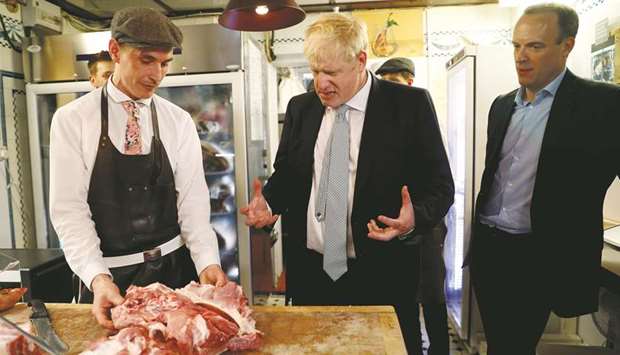Boris Johnson, the favourite to become prime minister, said he was prepared to lead Britain out of the European Union without a deal on October 31 and said any EU attempt to impose trade tariffs would be akin to a Napoleonic-era blockade.
The UK’s three-year Brexit crisis could be about to deepen as Johnson’s pledge to leave the EU with or without a deal on Halloween could provoke a standoff with parliament, which has indicated its opposition to a no-deal exit.
No-deal means there would be no transition period so the exit would be abrupt, the nightmare scenario for many businesses and the dream of hard Brexiteers who want a decisive split.
Johnson, a former foreign minister and London mayor, said he was convinced the EU would agree a new deal based on bits of outgoing Prime Minister Theresa May’s “dead” Withdrawal Agreement.
“My pledge is to come out of the EU at Halloween on October 31,” Johnson, 55, told BBC TV, adding that there were “technical fixes” to prevent the return of a hard border between EU-member Ireland and Northern Ireland, which is part of the UK.
Johnson reaffirmed his view, contested by many, that Britain could retain tariff-free trade with the EU after a no-deal exit.
“I think it would be very bizarre if the EU should decide on their own... if they decided to impose tariffs on goods coming from the UK it would be... a return to Napoleon’s continental system,” Johnson told LBC radio yesterday.
Napoleon Bonaparte’s ‘Continental System’ was a blockade whose aim was to cripple Britain’s economy during the Napoleonic wars in the early 19th century.
Bank of England governor Mark Carney has said a provision that permits trade to continue unchanged between two parties if they so decide could only be applied when a trade deal was in place or about to be in place.
Johnson repeated a warning that there would be “creative ambiguity” about when and how a previously agreed £39bn exit bill gets paid to the EU. He ruled out any extension of the Brexit talks beyond October 31.
He repeatedly refused to answer questions about an argument with his girlfriend which has raised doubts about his fitness to lead the country.
The EU has refused to renegotiate the Withdrawal Agreement reached with May last November, and Ireland has indicated it is not willing to change the Irish border “backstop” that upset the Northern Irish party which props up May’s minority government.
Johnson said he did not want a no-deal Brexit — which investors warn would roil financial markets and send shockwaves through the European economy — but that it was necessary to put it on the table so that Britain could get the result it wanted.
“The way to get our friends and partners to understand how serious we are is finally, I’m afraid, to abandon the defeatism and negativity that has enfolded us in a great cloud for so long and to prepare confidently and seriously for a WTO or no-deal outcome,” he said in the BBC TV interview on Monday evening.

Boris Johnson and former Brexit minister Dominic Raab visit a butcher’s shop in Oxshott, Surrey.
